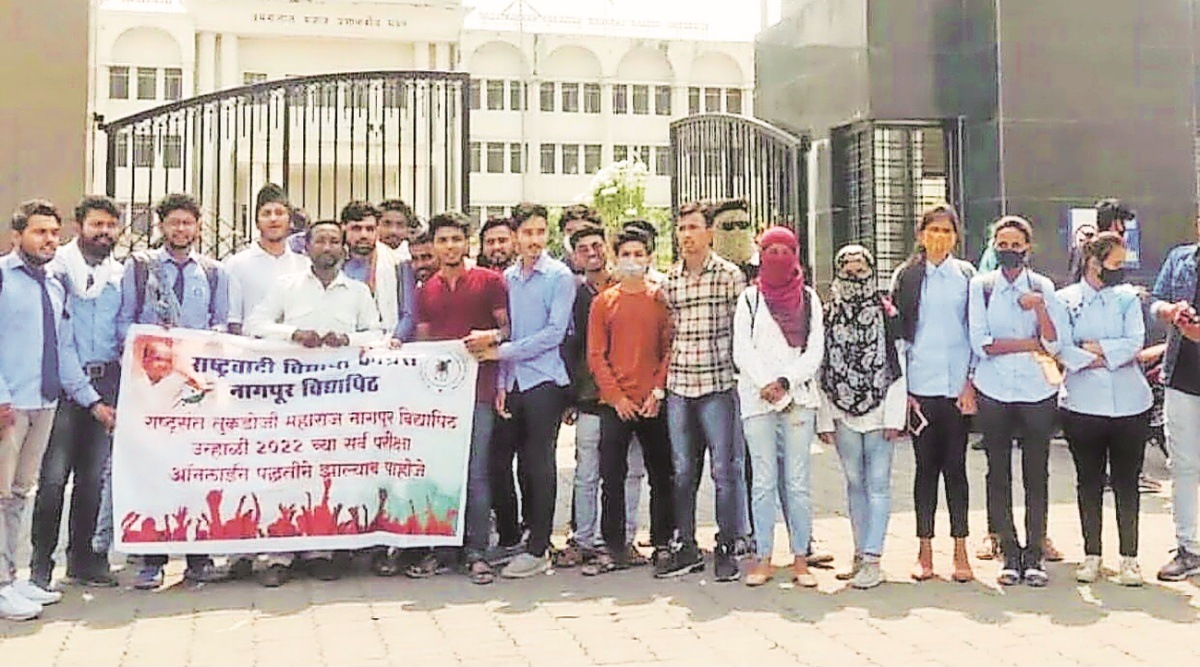Updated: April 17, 2022 9:42:02 am
 In Maharashtra, confusion over the format of the final exam has triggered a debate. The Maharashtra Student Welfare Association (MSWA) has started a social media campaign to “bring uniformity” to the assessment format after writing to the Chief Minister.
In Maharashtra, confusion over the format of the final exam has triggered a debate. The Maharashtra Student Welfare Association (MSWA) has started a social media campaign to “bring uniformity” to the assessment format after writing to the Chief Minister. When Allahabad University announced to conduct offline exams on March 24, it sparked widespread protests.
University officials countered that the move was “in line with restoring normalcy” and was taken after a high-power committee — formed to look into students’ representations against offline exams — submitted its report in favour of pen-and-paper exams.
University’s public relations officer Jaya Kapoor said: “Some of the protesting students sprinkled petrol on themselves and it became a law-and-order situation. The district administration requested that the vice-chancellor reconsider the students’ demands. So, on March 25 it was decided that all second-year students would be promoted and third-year students’ exams would be held online.”
Most universities in India have a semester system, with exams at the end of each semester — in May-June and November-December. This time, several universities have decided to hold offline exams for the semester ending in May-June 2022. But with little clarity over hostel arrangements, exam schedules and hybrid class timetables, the decision has been met with opposition in most states.
On April 13, Maharashtra Higher and Technical Education Minister Uday Samant announced additional 15 minutes for each hour students sit for an offline exam.
Since February 28, students and faculty at the Visva-Bharati University in West Bengal’s Santiniketan have been protesting against the decision to hold offline exams without reopening all student hostels.
“The majority of students lived in hostels. Initially, when the hostels were not operational and senior batches began attending offline classes on December 1, 2021, students rented rooms. Since there is limited accommodation available in the Santiniketan area, first-year students were unable to find housing when their offline classes resumed on February 1. They continued to take online classes and are now hesitant to take offline exams,” said Somnath Sow, a final-year BA economics student at Visva-Bharati University.
“The 26-day movement helped us secure our demands and online exams will begin on April 18. The demand for the reopening of hostels has been officially met, but in reality, things are still not clear, so protests are continuing,” said Chaiti, a student at the university’s department of art history.
Vice-Chancellor Bidyut Chakrabarty refused to comment.
Lack of accommodation is also why engineering students of Kolkata-based Jadavpur University have been protesting the decision to hold offline exams.
“Students in their final semester do not want to relocate from their hometowns for the remaining few months of their courses. Also, no one is willing to give their property on rent for a few months,” said Akash Sekh, a second-year master’s student of international relations.
However, the university has already released the schedule for offline exams and for some courses, the exams will commence on April 24.
Calls to University V-C Suranjan Das went unanswered.
Over 1,500 km away, at Delhi University, students have been demanding that their end semester examinations be conducted online. The university reopened in February and has also decided to hold offline exams for students in the second, fourth and sixth semesters.
Semester exams for the first, third, and fifth semesters will be administered in online OBE mode.
“The notification for offline exams was issued on February 9, and students have been protesting ever since. The majority of the coursework has been completed online and we have attended just over two months of offline classes. So, the mode of exams should be revised,” said Himani Singh, a sixth-semester BSc Home Science student at DU’s Lady Irwin College.
However, Pankaj Arora, DU’s dean of students’ welfare, said: “In order to return to normalcy, we must return to offline exams.”
He said: “Due to Covid, the ‘odd’ semester was shorter than usual and we decided to keep their exams online. The ‘even’ semester offline exam duration has been increased by 30 minutes. The university is also willing to issue a directive to individual colleges to hold mock tests.”
In Maharashtra, confusion over the format of the final exam has triggered a debate. The Maharashtra Student Welfare Association (MSWA) has started a social media campaign to “bring uniformity” to the assessment format after writing to the Chief Minister.
“The final-year students will be competing with each other for admission to higher education courses and in the job market. If their assessment is done in different formats, the competition will not be fair,” said Vaibhav Edke, MSWA president.
While Savitribai Phule Pune University (SPPU) and Rashtrasanta Tukdoji Maharaj Nagpur University will be holding offline exams, Mumbai University has announced a more “blended approach” — exams of traditional courses will be online, whereas for professional courses it will be offline. Also, many autonomous colleges in Mumbai have decided to hold final exams offline.
“For professional courses, students were anyway writing descriptive answers for 60 out of 100 marks for the past two exams. The only difference is that instead of writing it at home, they will be appearing for exams at their respective colleges,” said Vinod Patil, Director of Board of Examinations and Evaluation, Mumbai University.
Countering the students’ demand for “uniformity”, he said, “Anyway there can’t be parity as courses, curriculum, exam pattern and evaluation methods are different at different universities.”
- The Indian Express website has been rated GREEN for its credibility and trustworthiness by Newsguard, a global service that rates news sources for their journalistic standards.

